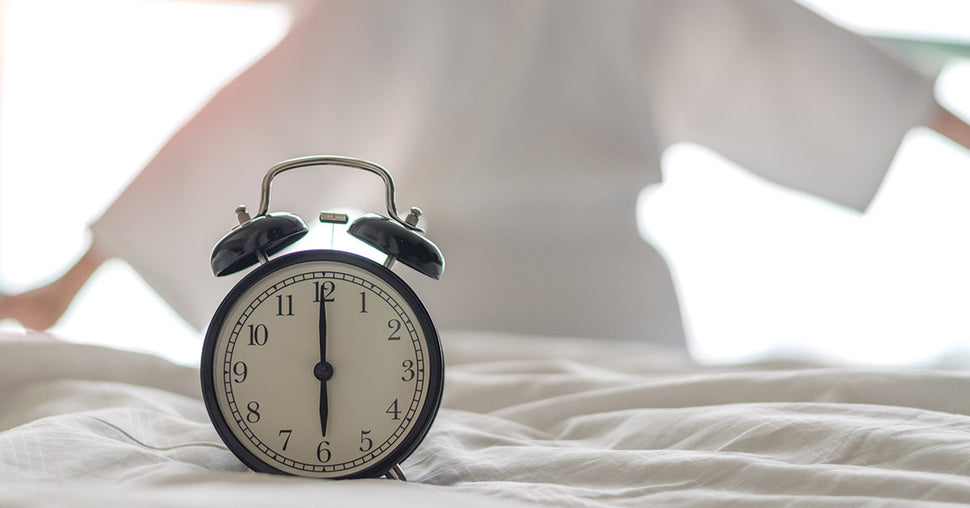How to Fix Your Circadian Rhythm for Better Sleep
15 Mar 2021
If you’re spending many a sleepless night, tossing and turning, just lying awake in bed, then look no further. In this article, we will explore some of the important reasons to fix your sleep cycle and adjust your sleep schedule.
Our internal clock, also called our circadian rhythm , is aligned with the 24-hour natural flow of daylight to darkness, and it’s crucial for our bodies to be aligned with this pattern.
Circadian rhythms govern our physical, mental, and behavioral changes within the frame of a day-to-day 24-hour cycle. Different systems of the body are controlled by the circadian rhythm of our body, and our sleep and wake cycle is just one of the common functions regulated by the circadian rhythm.
One of the main reasons why we are jetlagged on crossing more than two time zones is the imbalance of the circadian rhythm. Our internal clock, also called circadian rhythm , regulates our sleep-wake cycle. If you’re curious about how this works, keep reading… Simply put, the internal or biological clock in the brain helps our body stay alert or prepare for sleep based on the light we are exposed to. Hence, it helps align our sleep schedule with night and wakefulness with daytime . Humans are not the only beings experiencing the circadian rhythm. This exists in plants and animals too. For instance, even flowers open and close based on the cycle of the day and night. Similarly, animals and birds also leave their shelter in search of food during the day and return to their shelter by night.
Any disruption in this natural order on account of late nights or exposure to bright light from technical gadgets can hamper our circadian rhythm. Due to factors like stress, burning the midnight oil, shift in work timings, and excessive exposure to social media before sleep, the sleeping pattern can change, resulting in a disrupted circadian rhythm. To achieve good health and well-being, it’s crucial that we take our biological clock seriously and reset our sleep cycle.
Click Here And Fix Your Sleep Cycle
If you have ever felt sleepy in the afternoon, or if you have felt that your work starts too early, chances are that your bodily functions of sleeping and waking have been disrupted and are not synchronized with the circadian rhythm. Research clearly shows that improper sleeping patterns and a mal-adjusted sleep cycle can prove very detrimental to the body . Some of the immediate adverse effects of irregular sleep patterns may include poor metabolism, increased risk of obesity, lack of productivity, prolonged periods of lethargy, hormonal imbalance, and high blood sugar. A disrupted circadian rhythm can also result in a poor quality of sleep.
With a misaligned circadian rhythm, your sleep cycle can be adversely impacted in multiple ways, some of which include an increased risk of insomnia coupled with excessive daytime sleepiness. If you’re worried about your disrupted circadian rhythm and want to reset your sleep cycle here are some of the ways in which you can fix your sleep cycle.

- Soak in the sun: The sunlight is one of the prominent circadian cues that aligns the master clock in our body with our biological clock. Exposure to sunlight is a good way to get your circadian rhythm back in order.
- Get into a consistent sleeping routine: As much as possible, establish a routine of when to sleep and when to wake up. As much as you can, align this with the 24-hour cycle of day and night and help your body reschedule your sleep pattern. This is one of the best ways to have a well-adjusted biological clock.
- Exercise daily: Daily exercise during the day aligns your internal clock with alertness and activity and also makes it easier for you to fall asleep at night.
- Avoid caffeine in the later hours of the day: Caffeinated beverages make us active and energized. Consuming caffeine before bed or in the later hours of the day throws the circadian rhythm of your body off the whack. Having caffeinated drinks before bed can delay the initiation of sleep, besides reducing its quality.
- Limit exposure to artificial light before bed: Studies have shown that people who keep away from electronic devices before bed are likely to have a better sleep cycle. This is because the artificial light from operating phones and laptops till late hours of the night can severely disturb the circadian rhythm .
- Eliminate daytime napping: People with disrupted sleep cycles often trap themselves in a vicious cycle of sleeping late in the night, waking up early, being sleep deprived due to inadequate sleep, and resorting to daytime napping, which further leads to delayed sleep. As much as possible, avoid napping during the day, and whenever you can, try limiting your power naps to less than 2 hours.
Incorporating these lifestyle changes will go a long way in helping you restore order in your circadian rhythm and reset your biological clock. In case you have severe problems of lack of sleep or extreme daytime drowsiness, we advise you to consult a doctor who can guide you with specific measures.
Skin: Renew - Glutathione - Orange Flavour
- ₹1,994
- ₹1,994
-
₹2,600 - ( 23% OFF)
Categories
- Choosing a selection results in a full page refresh.
- Press the space key then arrow keys to make a selection.
this is the sidecart











